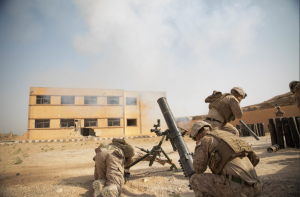Recent news that the Obama administration plans to expand drone warfare in Yemen under the auspices of the CIA — the military has already been running a smaller-scale drone war in Yemen for some time now — highlights the need to make drones a more central topic of conversation in discussion of the U.S.’s various wars and quasi-wars. Obama has proved significantly more trigger-happy than his predecessor when it comes to the use of drones, most likely springing from a belief that there’s little domestic political risk in drone warfare — particularly when compared to the commitment of ground troops.
Unfortunately, so far he’s been right, as war skeptics in both parties have proved unwilling to speak forcefully against Obama’s expansion of the drone war. Some Democrats seem to have made an opportunistic calculation that Predators and Reapers give the administration an opportunity to look tough and claim terrorist scalps at minimal political risk, while the murmurings of discontent over Afghanistan and Libya among Republicans — particularly visible in Monday’s primary debate — have not translated into any vocal criticism of the drone war. As long as American soldiers aren’t on the ground and taking casualties, there seems to be no appetite even among relative doves and anti-interventionists in Congress to criticize the administration on this issue.
This is a shame, because Obama’s expansion of drone warfare is extremely problematic both morally and strategically and deserves to be more publicly debated. The administration would like the public to believe that drone strikes are surgical operations targeting terrorist leaders based on surefire intelligence, and that civilian casualties are the exception rather than the rule. While the sheer number of reported civilian casualties and “high-value targets” who have been announced dead only to reappear suggest that this is a wildly optimistic picture, it’s difficult to tell just how wild — since the amount of reliable information that makes it back to the U.S. media is low and the administration has both the ability and the incentive to euphemize the civilian cost of the drone war. (Muhammad Idrees Ahmad has an important piece examining what he terms the “magic realism” of the body count numbers coming out of Afghanistan and Pakistan.)
And while the short-term domestic costs of the drone war for Obama are virtually nil, the long-term international costs are likely to be far greater. In the wake of the Arab Spring, it’s been grimly ironic these past few months to watch various Beltway pundits earnestly debating how the U.S. can “get on the side of the protesters” while having nothing whatsoever to say about the drone war. It only stands to reason, however, that the U.S. will continue to have trouble demonstrating its good intentions to the Muslim and Arab worlds so long as its primary instrument of foreign policy is a technology that seems more appropriate to the George Lucas’s Galactic Empire. Perhaps unsurprisingly, some of the only prominent pundits to question the use of drones have been counterinsurgency gurus such as David Kilcullen and Andrew Exum, who have observed the political fallout of the use of Predators and Reapers in Afghanistan and Pakistan.
Given the political incentives in play, it seems likely that the Obama administration will continue to expand the use of drones until factions within the U.S. show that they are willing to make the administration pay a political price at home. Some of this mobilization would have to come from the left, but this is also a scenario where self-styled Tea Party Republicans could put their money where their mouth is and go beyond mere murmurings of discontent over the course of U.S. foreign policy. Perhaps Michelle Bachmann can finally make herself useful?




